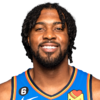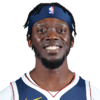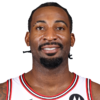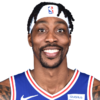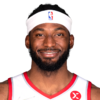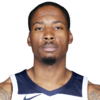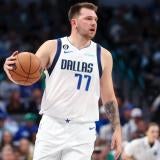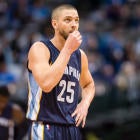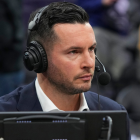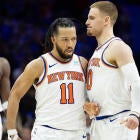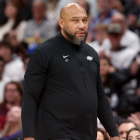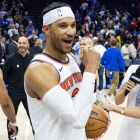Every NBA player who had a disappointing 2016-17 season is hoping to be this year's JaVale McGee. Sometimes, a clean bill of health and the right environment can make someone look like an entirely different person. As the regular season nears, here are 12 players looking to bounce back:
What happened last season? Nothing good. Due to knee injuries, Parsons played in 34 games and looked like a shell of himself, averaging 6.2 points and 2.5 rebounds in 19.9 minutes with a true shooting percentage of 43.6 percent. Grizzlies fans booed him, and Parsons now regrets thinking Grant Hill was soft when he was growing up a Magic fan and watching the perennial All-Star sit on the sidelines in street clothes. It was particularly frustrating because it was the first year of a four-year max contract worth about $95 million, and because Memphis desperately needed a player like him.
Reasons for optimism: All you have to do is read ESPN's Tim MacMahon's story about Parsons' summer. Everybody around Parsons says that, physically, he is in a completely different place than he was at any point last season. When he is at the top of his game, he is often praised for his versatility and skill set, but his athleticism should not be overlooked. Before the knee trouble, he was the rare 6-foot-10 guy who could take his man off the dribble, get into the paint and use his length to finish over rim protectors. If he is able to do that again, his contract suddenly won't look so bad.
What happened last season? He appeared in 50 games, started 39 of them and played through a ton of pain. He regained a little bit of his bounce come playoff time, but never really gave the Jazz front office the luxury of looking at good data with him and Rudy Gobert sharing the frontcourt. Favors didn't have a terrible season when you consider that he was dealing with both knee and back problems, but his minutes were down and his stats were underwhelming. He thinks that everybody has forgotten about him.
Reasons for optimism: He has apparently changed his diet, dropped nearly 20 pounds, yada yada yada. Along with finally being healthy, he will also have an opportunity to be a bigger part of Utah's offense. Much has been made of how Rodney Hood will have to become more of a playmaker now that Gordon Hayward is gone, but there should be more touches for Favors, too. One of the organization's top priorities has to be figuring out if he and Gobert are a workable long-term pairing.
What happened last season? Knee injuries suck. Jackson's season was derailed before it even started -- in training camp, tendinitis in his left knee forced him to sit out, and he wound up staying on the inactive list until December. When he came back, he didn't have his normal burst or confidence, the qualities that make him an effective pick-and-roll player. Formerly the Pistons' primary playmaker, he struggled to find his place and it disrupted his team's rhythm. Detroit consistently played better with Ish Smith running the show.
Reasons for optimism: Just look at how he played in 2015-16. Before the knee issues got serious, he and the next player on this list were one of the best pick-and-roll tandems in the league. Jackson's 3-point shooting was improving, too. The drop-off wasn't because the league changed or he found himself on a team that doesn't need a player like him -- it was entirely because of the injury. As you might expect, he spent his offseason strengthening the ligaments in his knee, per PistonPowered's Duncan Smith.
What happened last season? In a word, stagnation. Detroit hoped Drummond would make significant progress as a rim protector and free throw shooter, but that didn't happen. Without an aggressive Jackson attracting attention, the big man didn't get as many easy opportunities to score around the rim. His inconsistency continued to be confusing, as did the fact that backup center Aron Baynes' on/off numbers were so much better than Drummond's. To say he failed to live up to his five-year max contract would be a massive understatement.
Reasons for optimism: If not now, then when? The Pistons had a horrible season, and Drummond's name ended up in trade rumors. They have invested in him, both in terms of literal dollars and acquiring players that are supposed to complement him. He needs serious improvement in several areas, but should have all the motivation he could possibly need to put it together. Also, it'd help quite a bit if Jackson was back to normal.
What happened last season? He joined his hometown Chicago Bulls, who had already signed Rajon Rondo and were mired in mediocrity. His per-game numbers didn't look that bad -- 18.3 points, 4.5 rebounds, 3.8 assists -- but he had the lowest true shooting percentage of his career and the team was significantly better when he was on the bench. It was an awful, awful fit, and Wade was directly involved in predictable locker-room drama. While he and Jimmy Butler got along famously, Chicago was undone by chemistry issues on and off the court.
Reasons for optimism: The Cavs couldn't be more different from the Bulls. There is no confusion over what their goals are, and the roster is full of shooters to open things up for LeBron James. Those shooters will make life easier for Wade, too, and perhaps reuniting with James will turn Wade into one of the best cutters in the league again. There is also the simple fact that a smaller role should be good for him -- at 35 years old, his usage rate probably shouldn't approach 30 percent anymore, and it's hard to imagine that happening in Cleveland.
What happened last season: He broke his thumb in late December, missed half the regular season and had an extremely inefficient year, shooting 34.6 percent and making only 35.1 percent of his 3-pointers. It is hard to be too critical of his performance in the court, though, given that his daughter, Dakota, was born four months premature. She only came home to the Smith family in the middle of the conference finals.
Reasons for optimism: His jumper hasn't just vanished. He will get the open looks he always does in the Cavs' offense, and he should have to expend less energy on defense -- the addition of Jae Crowder means that Smith will no longer have to chase around the opposing team's best wing player all the time. With Wade and Derrick Rose on the roster, driving and kicking could become an even bigger part of Cleveland's attack.
What happened last season? With Noah, it's more a case of what has happened in the last few years. He was on this list 12 months ago, and he hasn't been the same since he had surgery on his left knee after his fantastic 2013-14 Defensive Player of the Year season. After a series of injuries, he was suspended for 20 games for violating the league's anti-drug policy. He said on a podcast that an over-the-counter supplement was contaminated with something that was on the NBA's banned substance list. In the same interview, Noah said he lost his confidence, let people down and beat himself up.
Reasons for optimism: He wants to redeem himself. He is a high-IQ player. Even if he doesn't become who he once was or live up to his four-year, $72 million contract, he can be a solid role player who makes his teammates better as long as he is mobile. In a weird way, the suspension could help him out, allowing him to take some extra time to get his body ready before he makes his regular-season debut.
What happened last season? You could say that Howard did what he was supposed to do for the Hawks, dominating the glass and anchoring their defense. He was actively harmful to their offense, though, and he couldn't stay on the floor in the playoffs because he was slow in transition and cramped Atlanta's spacing. His numbers were fine, but several Hawks players screamed with jubilation when they learned they wouldn't have to play with him anymore, according to ESPN's Kevin Arnovitz.
Reasons for optimism: Everybody knows about Howard's history with Charlotte coach Steve Clifford, and there's no reason he can't be a perfectly suitable pick-and-roll partner for Kemba Walker. Howard has given some good interviews lately, sounding excited about his new home. The problem is that he is still talking about wanting to be dominant on offense, and it should say something that the Hawks were happy to shed his contract in a "salary dump" that didn't actually save them money. Believing in Howard basically means believing that Clifford can get through to him about doing only the things he does best.
What happened last season? His offensive limitations were pretty obvious when he was asked to play a bigger role at the start of the season. Then, when he got hurt and had shoulder surgery, Miami went bananas, winning 30 of 41 games and almost sneaking into the playoffs. His place on the roster became the subject of much speculation, given that he's probably best suited to play power forward and the Heat have a logjam at that position.
Reasons for optimism: He has received rave reviews for his work ethic during his rehab, and he certainly doesn't lack confidence. While his jumper is still a massive question mark, he is so good in other areas that merely being an average shooter would make him an extremely valuable player. Also, compared to the other guys on this list, Winslow is a baby. At just 21 years old, he still has All-Star potential.
What happened last season? Like Favors, Davis tried to stay on the court even when he probably shouldn't have. In March, he finally had surgery on his shoulder, finishing the season with his worst statistical production since his days fighting for scrap minutes behind Marc Gasol and Zach Randolph in Memphis.
Reasons for optimism: Shoulder injuries are tough for anybody, but particularly for a player like Davis. His game is based on energy and activity around the basket on both ends. Coach Terry Stotts says he looks like "like Ed from two years ago," when he was among the best reserves in the league. Now, he wants to start.
What happened last season? Turner and the Blazers stumbled to start the season, and it took a while for him to get his footing in Stotts' system. Even though he got better as the season went on, it's impossible to look at his first year in Portland as a success -- the team was 7.7 points per 100 possessions better with him off the court than on it.
Reasons for optimism: He has a full season with the Blazers under his belt now. The player he was in Boston has to be in there somewhere, and it's not as if he has had any health problems. The challenge is making use of his playmaking skills without doing too much damage to their spacing or taking the ball out of Damian Lillard and C.J. McCollum's hands for long stretches.
What happened last season? He was supposed to be the offensive focal point of the Pacers' second unit, and it didn't work out. Come playoff time, he was not even in the rotation. It's hard to say how much of this was even his fault -- aside from his poorer-than-usual midrange shooting, Jefferson pretty much did what he has always done. It's hard out there for slow-footed centers who can't protect the rim, even if they have an impressive arsenal of post moves.
Reasons for optimism: He is thinner, thanks to becoming a vegetarian, and that should make him quicker on his feet. No one expects him to suddenly become an amazing pick-and-roll defender, but if this means he can at least have a chance when defending on the perimeter, then he'll be able to earn his minutes again.
Honorable mentions: Lance Thomas, Knicks; Marvin Williams, Hornets; Nicolas Batum, Hornets; Ian Mahinmi, Wizards; Quincy Pondexter, Bulls; Omri Casspi, Warriors; Jordan Clarkson, Lakers; DeMarre Carroll, Nets







